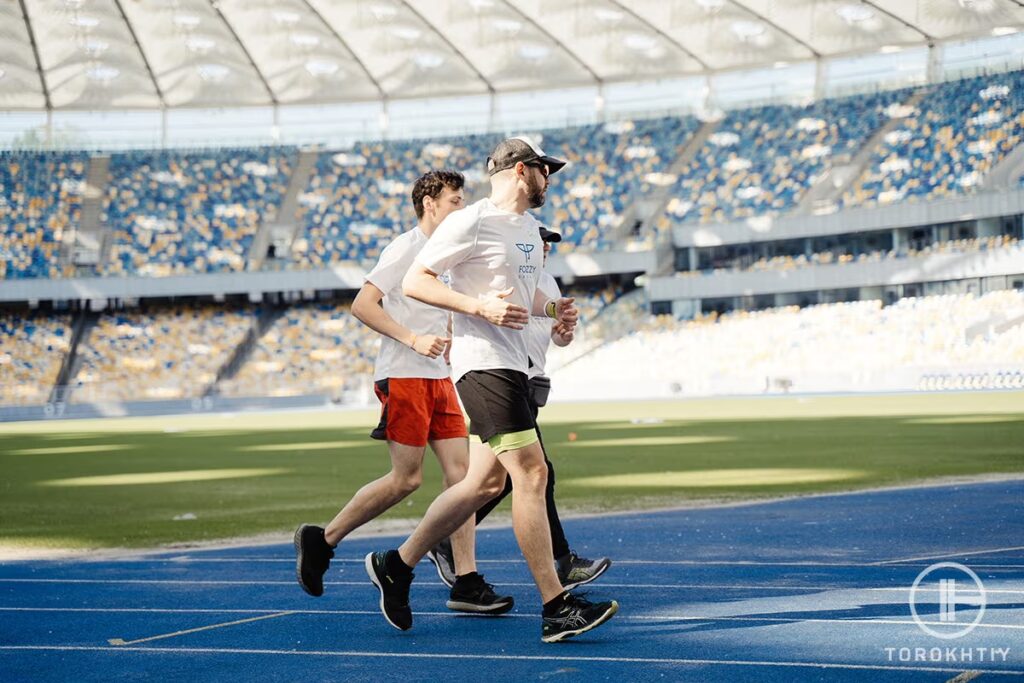Running 15 Miles a Week: 4-Week Training Plan + 5 Benefits
Author:
Unlock your full potential by engaging with our experts and community! Have questions about your fitness journey or looking for expert advice on weightlifting techniques? Don’t hesitate — leave a comment below and Oleksandr Zagrebelnyi will provide a personalized answer and insights to help you reach your goals.
Torokhtiy is reader-supported. Some links are affiliate links, and we may earn a commission at no extra cost to you. See our disclosure page for details.
One way to challenge yourself and reap even more benefits from running is by setting a weekly goal. Many runners aim to increase their loads to running 15 miles a week. This goal can motivate you and help you stay on track with your fitness routine.
How long does it take to run 15 miles a week for a beginner? And what are the benefits of running 15 miles per week? This article will tell you everything you need to know about this distance and provide you with a detailed training plan.
Is Running 15 Miles a Week Suitable for Everyone? – It is great for experienced runners, as it can help you stay active, reduce stress, and burn calories. However, this distance can be challenging for beginners and can lead to a risk of burnout, if you don’t increase your mileage gradually.

Is Running 15 Miles a Week Good for You?
Is running 15 miles a week good for everyone? We will discuss the benefits and risks of running 15 miles a week for beginners, experienced runners, and older people.
1. Is Running 15 Miles a Week Safe for Beginners?
Running 15 miles a week may be too much for beginners, and can potentially cause injuries. It is recommended that beginners start with low mileage and gradually increase it over time. A good starting point is to run 2-3 miles three times per week.
As your body adapts to your new exercise routine, you can gradually increase the distance. Running too much too soon can lead to injuries, such as shin splints, stress fractures, and tendinitis.
2. Is Running 15 Miles a Week Safe for Experienced Runners?
For experienced runners, running 15 miles a week is a reasonable goal. If you are an experienced runner, your body has already adapted to the stress of running. However, listening to your body and avoiding overtraining is still important. It is recommended that you incorporate rest days and cross-training activities to prevent injuries.
3. Is Running 15 Miles a Week Safe for Older People?
Running can be a great way for older people to stay active and healthy. However, consulting with a doctor before starting any new exercise routine is important.
Older people may have a higher risk of joint and bone injuries, and running may exacerbate these conditions. It is recommended that older people start with low mileage and gradually increase it over time. It is also important to incorporate strength training and stretching exercises to prevent injuries.

5 Benefits of Running 15 Miles a Week
Running has always been a popular form of exercise and for good reason. It has numerous physical and mental benefits that can greatly improve your overall health and well-being. Let’s discuss the top five benefits of running 15 miles a week.
✅ Improved Cardiovascular Health
Running 15 miles a week can greatly improve your cardiovascular health. Regular running helps to strengthen your heart, which means it can pump more blood with each beat. This results in a lower resting heart rate and improved blood flow, which can reduce your risk of heart disease, stroke, and high blood pressure.
✅ Weight Loss
Running is also an effective way to lose weight, and running 15 miles a week for weight loss can help you achieve your goals. Running burns a significant number of calories.
When combined with a healthy diet, this can lead to significant weight loss over time. It also helps to increase your metabolism, which means your body will continue to burn calories even after you finish your run.

✅ Improved Mental Health
In addition to the physical benefits, running 15 miles a week can positively impact your mental health. Running releases endorphins, which are natural feel-good chemicals that can help reduce stress and improve your mood.
Running can also be a form of meditation, allowing you to clear your mind and focus on the present moment.
✅ Increased Endurance
Running 15 miles a week can also help to increase your endurance. Regular running helps to improve your lung capacity and oxygen uptake, which means you can run for longer periods of time without getting tired.
This increased endurance can also translate to other areas of your life, such as increased energy levels and improved productivity.
✅ Stronger Muscles and Bones
Finally, running 15 miles a week can help to strengthen your muscles and bones. Running is a weight-bearing exercise that helps build bone density and muscle mass. This can reduce your risk of osteoporosis and other bone-related conditions and improve your overall strength and physical performance.
3 Disadvantages of Running 15 Miles a Week
Like any form of physical activity, running also comes with risks, particularly when done in excess. Here are three potential risks associated with running 15 miles per week.
❌ Overuse Injuries
One of the biggest risks associated with running is the development of overuse injuries. These injuries occur when a particular body part is subjected to repeated stress without enough time to recover.
Running 15 miles per week may not seem like a lot, but it can still put significant stress on the body, particularly if the runner is not properly stretching, warming up, and cooling down. Common overuse injuries associated with running include shin splints, plantar fasciitis, and IT band syndrome.

❌ Weakened Immune System
While moderate exercise can boost the immune system, excessive exercise can have the opposite effect. Running long distances regularly can strain the immune system, making it more difficult for the body to fight off infections.
This is because running causes an increase in stress hormones like cortisol, which can suppress the immune system. In addition, running can also cause inflammation in the body, which can further weaken the immune system.
❌ Burnout
Running 15 miles per week can be mentally and physically demanding, particularly if the runner is pushing themselves to improve their time or distance. Over time, this can lead to burnout, which is a state of physical, emotional, and mental exhaustion.
Burnout can cause various symptoms, including fatigue, insomnia, mood changes, and decreased performance. To avoid burnout, runners should take rest days when needed and vary their workouts to prevent boredom and overuse injuries.
How to Run 15 Miles a Week: A Weekly Training Plan
Are you looking to improve your running endurance and reach the 15-mile-per-week milestone? Whether you’re a beginner or an experienced runner, following a training plan is essential to help you reach your goals. We’ll outline a 4-week training plan for all runners looking to run 15 miles a week.
Training Plan for Beginners
Here is the training plan that allows you to gradually reach 15 miles a week.
| Week | Monday | Tuesday | Wednesday | Thursday | Friday | Saturday | Sunday |
|---|---|---|---|---|---|---|---|
| 1 | Rest | Slow pace 2 miles | 5 *(100m sprint + 100m jog) | Rest | Slow pace 3 miles | Rest | Long runs 3.5 miles |
| 2 | Rest | Slow pace 2 miles | 5 *(100m sprint + 100m jog) | Rest | Slow pace 4 miles | Rest | Long runs 4.5 miles |
| 3 | Rest | Slow pace 2 miles | 5 *(100m sprint + 100m jog) | Rest | Slow pace 4.5 miles | Rest | Long runs 5 miles |
| 4 | Rest | Slow pace 2 miles | 5 *(100m sprint + 100m jog) | Rest | Slow pace 5 miles | Rest | Long runs 5 miles |
This training plan combines slow-pace runs, interval loads, and long runs. Such a combination can help you build your endurance and speed and increase your weekly run time to 15 miles with a lower risk of injuries.
Slow-pace runs are essential to any training plan, as they build your endurance and help prevent injuries. Remember, the key is to run at a conversational pace, where you can easily talk without getting out of breath.
Training Plan for Experienced Runners
Here is a 4-week training plan for increasing weekly distance. It will be useful if you are a more experienced runner but have not yet tried running 15 miles a week.
| Week | Monday | Tuesday | Wednesday | Thursday | Friday | Saturday | Sunday |
|---|---|---|---|---|---|---|---|
| 1 | Interval training 8 x 100m | Rest | Tempo runs 2 miles | Rest | Long runs 4 miles | Rest | Slow pace 3 miles |
| 2 | Interval training 6 x 200m | Rest | Tempo runs 3 miles | Rest | Long runs 5 miles | Rest | Slow pace 4 miles |
| 3 | Interval training 4 x 400m | Rest | Tempo runs 3 miles | Rest | Long runs 5 miles | Rest | Slow pace 4 miles |
| 4 | Interval training 2 x 800m | Rest | Tempo runs 4 miles | Rest | Long runs 6 miles | Rest | Slow pace 5 miles |
You can adjust the distances based on your fitness level and running experience. If the distances listed in the table are too challenging, start with a lower distance and gradually increase it each week.
Pro Tip
Tempo runs are done at a comfortably challenging pace that you can maintain for a long time. This type of training helps improve your lactate threshold, which is the point at which your body starts to produce more lactic acid than it can clear.
Running Coach Nike Run Club Kyiv
Running Time Calculator: Running 15 Miles Per Week
This running time calculator employs a formula considering the distance, gender, training level, and age of the runner. Use our calculator below to estimate the approximate time needed to cover your desired distance.
Running Time Calculator
Result:
Hoka Bondi 8
- Material: Breathable and supportive mesh upper
- Sole Material: Full-length EVA midsole for maximum cushioning
- Outsole (tread feature): Durable rubber outsole with a unique lug pattern
- Drop: 4mm
- Season: Suitable for all seasons
- Special Features: Exceptional cushioning and comfort
- Size: Available in various sizes
- Type: Maximum cushioning running shoe
If you want excellent running or walking shoes or just footwear you’ll be comfortable in, you can’t go wrong with the Hoka Bondi 8.
It’s been upgraded and now they have lighter, softer materials and a new extended heel design. The heel design gives a super soft, balanced feeling from th emoment your heel hits the ground to when you push off with your toes.
As far as the weight goes, it’s around 10.80 ounces, and the heel drop is 4 mm. They’re not too heavy and the lower drop is a good balance between cushioning and feeling connected to the ground.
The Bondi 8 is focused on cushioning and keeps things simple. There’s a good amount of support without any extra stuff that you don’t really need and that would only jack up the price. Take the rear crash pad, for example – it makes for a soft, smooth ride, which is perfect if you like to run outdoors.

The upper part is made of engineered mesh, which is breathable and keeps your feet cool and dry. The tongue and collar have memory foam and mold to your foot shape. All of these features make the fit snug but flexible, which is exactly what you would want.
The Bondi 8 is eco-friendly because it uses recyclable materials in parts like the mesh and the sockliner. Plus, the shoes are completely vegan, which (if that’s important to you) is nice!
FAQ
Is It Bad to Run Over 15 Miles a Week?
Some experts say that running more than 15 miles a week can increase the risk of injury and burnout if you are a beginner. However, others argue that running more than 15 miles a week can benefit more experienced runners with proper training and rest.
Why Am I Not Losing Weight by Running 15 Miles a Week?
If you don’t have weight loss results after running 15 miles a week, it could be due to several factors. Perhaps you’re consuming too many calories, not getting enough sleep, or not incorporating strength training into your routine. Evaluating your diet and lifestyle is essential to determine why you’re not losing weight.
conclusion
Running 15 miles a week is a great goal to strive for. It can provide numerous physical and mental health benefits, including improved cardiovascular health, weight loss and management, and mental health benefits.
If you are new to running, starting slowly and gradually increasing your mileage is essential to prevent injury. Always listen to your body and consult with a healthcare professional before beginning any new exercise routine if you have any history of injuries.
Have you ever tried to run 15 miles a week? Please share your experience in the comments below.
Also read:
- 30 minute 5k
- What Are Fartlek Workouts? Benefits And Drawbacks
- Average 2 Mile Run Time
- What to Wear Running in 60 Degree Weather
References:
- Relationship of Distance Run per Week to Coronary Heart Disease Risk Factors in 8283 Male Runners The National Runners’ Health Study // PMC: https://www.ncbi.nlm.nih.gov/pmc/articles/PMC3756592/
- The psychological benefits of recreational running: a field study // PubMed: https://pubmed.ncbi.nlm.nih.gov/22780910/
- An epidemiologic study of the benefits and risks of running // PubMed: https://pubmed.ncbi.nlm.nih.gov/7143687/
- TRAINING ERRORS AND RUNNING RELATED INJURIES: A SYSTEMATIC REVIEW // PMC: https://www.ncbi.nlm.nih.gov/pmc/articles/PMC3290924/
- Optimal Running Dose and Cardiovascular Risk // PubMed: https://pubmed.ncbi.nlm.nih.gov/29889148/
- Photos are made by Torokhtiy Media Team, Drazen Zigic pch.vector Freepick
Why Trust Us?
With over 20 years in Olympic weightlifting, strength training, nutrition coaching, and general fitness our team does its best to provide the audience with ultimate support and meet the needs and requirements of advanced athletes and professional lifters, as well as people who strive to open new opportunities and develop their physical capabilities with us.
By trusting the recommendations of our certified experts in coaching, nutrition, and sports training programming, as well as scientific consultants, and physiotherapists, we provide you with thorough, well-considered, and scientifically proven content. All the information given in the articles concerning workout programming, separate exercises, and athletic performance, in general, is based on verified data.
The product testing process is described in more detail here.
Oleksandr is a running coach and member of the Nike Run Club coaching team for 8 years. A participant in national and international competitions at distances from one kilometer to the ultra trail. Owner of mountain trail running camps. Nowadays Oleksandr is responsible for creating running training programs for athletes of various levels, coaching personally offline and online, conducts trail running camps in the mountains, participates in competitions.




Still have questions after reading our article? Unlock your full potential by engaging with our experts and community! Don’t hesitate — leave a comment below and Oleksandr Zagrebelnyi will provide a personalized answer and insights to help you reach your goals.